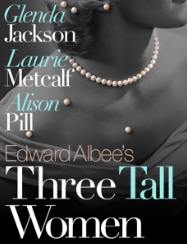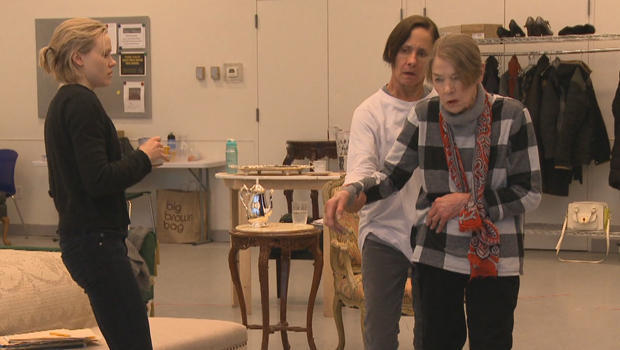by Eric Blume
 The Broadway revival of Edward Albee’s 1994 play Three Tall Women opens on Thursday. It stars Alison Pill, freshly Oscar nominated Laurie Metcalf, and two-time Oscar winner Glenda Jackson, who hasn’t been on an American stage in 32 years.
The Broadway revival of Edward Albee’s 1994 play Three Tall Women opens on Thursday. It stars Alison Pill, freshly Oscar nominated Laurie Metcalf, and two-time Oscar winner Glenda Jackson, who hasn’t been on an American stage in 32 years.
Director Joe Mantello builds a stunning production. Albee’s play, which won the Pulitzer Prize when it debuted off-Broadway in 1994, holds up beautifully, as all of his major plays do. Albee writes in a theatrical, controlled, but go-for-broke language that soars in the way only the best theater can. Three Tall Women is a major play, like Who’s Afraid of Virginia Woolf? and Seascape and The Zoo Story and A Delicate Balance and The Goat, Or Who is Sylvia?. It’s mind-boggling when you think of this man’s contribution to the theater, and the deep and compelling issues and emotions he tackled during his long career.
 rehearsing Three Tall Women
rehearsing Three Tall Women
Act One of Three Tall Women deals with a rich, dying old woman (Jackson), her caretaker (Metcalf), and her legal representative (Pill)...
Then Act Two begins (without intermission) with a twist: all three actors are playing age-different versions of the oldest woman, who lies behind them in a coma. Mantello treats this whammy with a no-nonsense crispness, trusting the audience will catch up in due time and stretch their theatrical minds.
Allison Pill has the smallest role but she registers, and her cling to hope makes the play’s meanings deeper and more beautiful. For those of us still bruised about Metcalf’s Oscar loss, it’s thrilling to see her firing once again on all cylinders. Her quicksilver mind and peerless comic instincts mine every ounce of wit and humor from the piece, but she can turn on a dime to bring on darkness, too. The three actresses work beautifully and generously with each other.
Which brings us to Glenda Jackson. Jackson took 23 years off from acting to engage in a political career, and she came back only a few years ago to play King Lear in London. Jackson was of course a major film actress during the 1970s, winning two Best Actress Oscars for Women in Love and A Touch of Class. While that Oscar for A Touch of Class remains one of Oscar’s true oddball wins, she made a big contribution to cinema. She was the muse of crazy director Ken Russell for several of his films, and received an additional Best Actress nomination for her lovely work in Sunday, Bloody Sunday. She wasn’t a cuddly actress, and her power came from how distanced she kept you. She was remote and chilling, intellectual and intimidating, but utterly spellbinding in her best roles.
She’s Tony-bound for this performance in Three Tall Women. She holds the stage with the same indomitable control she was always known for. She captures the dementia in Act One with unerring accuracy and terrifying force. And in Act Two she conjures an ethereal quality that seems to float inbetween memory and reality. She rules the stage with authority, but she doesn’t run over Metcalf and Pill …she works with them, trusting when to pull into another lane and pass them only as the text dictates. Her gravitas is heart-stopping, but she’s light and funny too when she sees an opportunity. It’s going to be the performance of the season.
 Metcalf, Jackson, and Pill photographed by Peter Hapak for New York Magazine
Metcalf, Jackson, and Pill photographed by Peter Hapak for New York Magazine
P.S. If (when) Jackson wins the Tony, she will become the 24th actor to complete the official Triple Crown of Acting (performers who have won competitive Oscar, Tony, and Emmy Awards). The most recent Triple Crowners are Christopher Plummer, Helen Mirren, Frances McDormand, Jessica Lange, and Viola Davis. Could anyone have imagined Glenda Jackson would be making this kind of comeback at age 81 ?!?